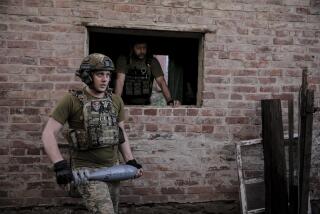SPEECH EXCERPTS
- Share via
Excerpts of President Bush’s speech as prepared for delivery Thursday night:
--
The surge
The premise of our strategy is that securing the Iraqi population is the foundation for all other progress. For Iraqis to bridge sectarian divides, they need to feel safe in their homes and neighborhoods. For lasting reconciliation to take root, Iraqis must feel confident that they do not need sectarian gangs for security. The goal of the surge is to provide that security and to help prepare Iraqi forces to maintain it. As I will explain tonight, our success in meeting these objectives now allows us to begin bringing some of our troops home.
Since the surge was announced in January, it has moved through several phases. First was the flow of additional troops into Iraq, especially Baghdad and Anbar province. Once these forces were in place, our commanders launched a series of offensive operations to drive terrorists and militias out of their strongholds. Finally, in areas that have been cleared, we are surging diplomatic and civilian resources to ensure that military progress is quickly followed up with real improvements in daily life.
--
Anbar province
Anbar province is a good example of how our strategy is working. Last year, an intelligence report concluded that Anbar had been lost to Al Qaeda. Some cited this report as evidence that we had failed in Iraq and should cut our losses and pull out. Instead, we kept the pressure on the terrorists. The local people were suffering under the Taliban-like rule of Al Qaeda, and they were sick of it. So they asked us for help.
To take advantage of this opportunity, I sent an additional 4,000 Marines to Anbar as part of the surge. Together, local sheiks, Iraqi forces and coalition troops drove the terrorists from the capital of Ramadi. . . . Today, a city where Al Qaeda once planted its flag is beginning to return to normal. Anbar citizens who once feared beheading for talking to an American or Iraqi soldier now come forward to tell us where the terrorists are hiding. Young Sunnis who once joined the insurgency are now joining the army and police. . . .
These developments do not often make the headlines, but they do make a difference. During my visit to Anbar on Labor Day, local Sunni leaders thanked me for America’s support. They pledged they would never allow Al Qaeda to return. . . .
In Anbar, the enemy remains active and deadly. Earlier today, one of the brave tribal sheiks who helped lead the revolt against Al Qaeda was murdered. In response, a fellow Sunni leader declared: “We are determined to strike back and continue our work.” And as they do, they can count on the continued support of the United States.
--
The Iraq government
Now the Iraqi government must bring the same determination to achieving reconciliation. This is an enormous undertaking after more than three decades of tyranny and division. The government has not met its own legislative benchmarks, and in my meetings with Iraqi leaders, I have made it clear that they must.
Yet Iraq’s national leaders are getting some things done. For example, they have passed a budget. They are sharing oil revenues with the provinces. They are allowing former Baathists to rejoin Iraq’s military or receive government pensions. And local reconciliation is taking place. The key now is to link this progress in the provinces to progress in Baghdad. As local politics change, so will national politics.
--
Troops on the ground
Our troops in Iraq are performing brilliantly. Along with Iraqi forces, they have captured or killed an average of more than 1,500 enemy fighters per month since January. Yet ultimately, the way forward depends on the ability of Iraqis to maintain security gains. According to Gen. Petraeus and a panel chaired by retired Gen. Jim Jones, the Iraqi army is becoming more capable, although there is still a great deal of work to be done to improve the national police. Iraqi forces are receiving increased cooperation from local populations. And this is improving their ability to hold areas that have been cleared. Because of this success, Gen. Petraeus believes we have now reached the point where we can maintain our security gains with fewer American forces. He has recommended that we not replace about 2,200 Marines scheduled to leave Anbar province later this month. In addition, he says it will soon be possible to bring home an Army combat brigade, for a total force reduction of 5,700 troops by Christmas.
And he expects that by July, we will be able to reduce our troop levels in Iraq from 20 combat brigades to 15.
--
‘Return on success’
The principle guiding my decisions on troop levels in Iraq is ‘return on success.’ The more successful we are, the more American troops can return home. . . . Americans want our country to be safe and our troops to begin coming home from Iraq. Yet those of us who believe success in Iraq is essential to our security, and those who believe we should bring our troops home, have been at odds. Now, because of the measure of success we are seeing in Iraq, we can begin seeing troops come home.
The way forward I have described tonight makes it possible, for the first time in years, for people who have been on opposite sides of this difficult debate to come together. This vision for a reduced American presence also has the support of Iraqi leaders from all communities. At the same time, they understand that their success will require U.S. political, economic and security engagement that extends beyond my presidency. These Iraqi leaders have asked for an enduring relationship with America. And we are ready to begin building that relationship in a way that protects our interests in the region and requires many fewer American troops.
--
Text obtained from the Associated Press.
More to Read
Get the L.A. Times Politics newsletter
Deeply reported insights into legislation, politics and policy from Sacramento, Washington and beyond. In your inbox three times per week.
You may occasionally receive promotional content from the Los Angeles Times.










